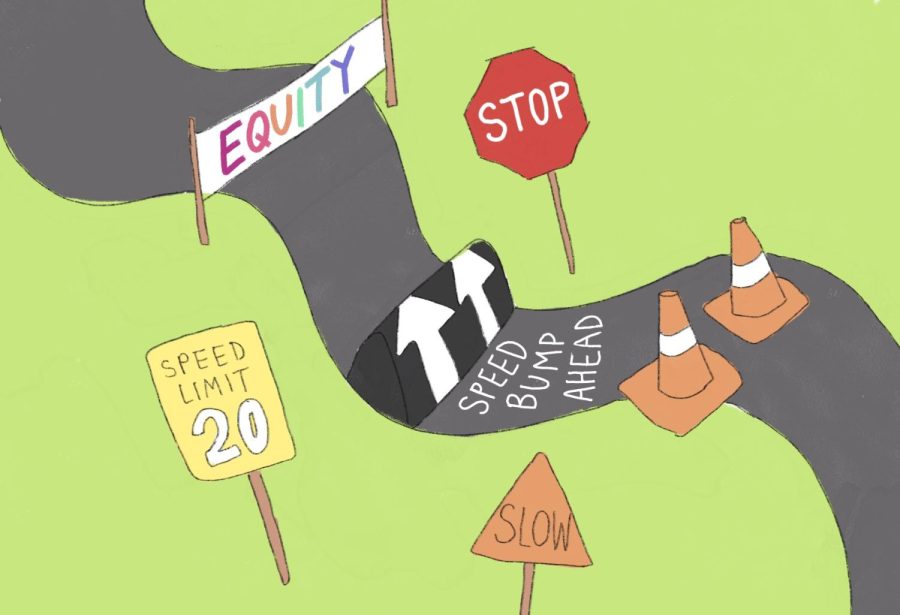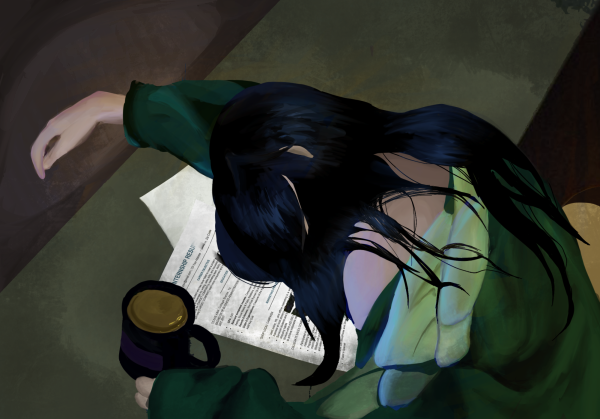District Rejects LEC Equity Lesson
Since Campolindo’s newest equity initiatives began at the start of the 2020-2021 academic year, school and districtwide equity lessons have been subject to mass scrutiny. In light of criticism, steps have been taken in the hopes of improving the reception of equity work on campus, along with working towards actionable change.
This year, Leadership Equity Council (LEC), a new leadership class focused on using student voices to address prejudice and diversity, was created. In theory, LEC students work with teachers, administrators, and district leadership to implement policies and lessons that will help to improve our campus culture from the inside out.
1 of the primary goals of LEC was to improve the quality and scope of academy equity lessons. Though these lessons began as weekly presentations via Zoom in academy cohorts, they now have occurred during periodic academies with students’ 4th period classes. Teachers are typically provided with a themed slideshow teaching a specific lesson, ranging from biases to Sexual Orientation, Gender Idenity, and Expression (SOGIE). Over time, LEC members began to join teachers in order to more effectively standardize the information and discussions students receive.
At the beginning of this semester, LEC members senior Fitz (any pronouns), senior Aeryn Armstrong-Azhar (he/they), and junior Diego Davila Gil received permission to work on an equity lesson centered around gender. They maintained contact with Dr. Lynnā McPhatter-Harris, the director of student support, equity and inclusion, who has created all of the equity lessons thus far.
Fitz said, “Us in LEC have been pushing for more student involvement in the equity lessons because student perspectives are really valuable…Dr. Harris agrees. She reiterates a lot that she’s on board with student involvement in all of this stuff.” Harris granted Fitz and Armstrong-Azhar the freedom to create their own gender lesson, defining gender identies and discussing pronouns. The gender lesson was intended to be taught at all schools in the Acalanes Union High School District (AUHSD) as the final lesson of the year on April 29.
“Aeryn and I, 2 queer people, were really excited about our perspectives being out there and [being] shared with the whole district,” said Fitz. After finishing the presentation, the slideshow received the stamp of approval from Harris, LEC adviser Molly Kerr, principal John Walker, and other school and district personnel.
Initially, the team was given a mere 2 days to prepare the lesson in February, but were later informed its debut would be pushed to March, and then to April. However, LEC learned atlast that it had been canceled altogether. In its place, students were shown a “recap” lesson, culminating the year’s equity instruction.
“[It] was really disappointing that the district was initially on board with students being in control of making these equity lessons, but then our work got pushed back and what we got was a lesson that didn’t seem to connect with students very much…There was so much opportunity for people to learn more about gender and pronouns, and that was just erased,” said Fitz. “I know that there are going to be efforts to do that next year, but it’s disappointing that we didn’t see that much this year.”
As for why the gender lesson was overturned, LEC received a “very vague answer,” according to Fitz. Reportedly, the district was concerned that some students would not have access to necessary support systems following the lesson.
Armstrong-Azhar said, “I guess teachers weren’t prepared at other schools. There was apparently a lot of harm that was caused after the sexuality lesson, but I wish they would have told us in March, ‘Hey, this isn’t going to happen,’ instead of being like, ‘Oh, it’ll be in April…Now we’re not having it at all.’”
To address these concerns, Campolindo’s Sexuality and Gender Alliance (SAGA), of which Armstrong-Azhar is the president, had planned to host a meeting for students to attend in order to engage in further discussion and hopefully have any outstanding questions answered. Unfortunately, this intent never came to fruition once the gender lesson was canceled.
Armstrong-Azhar said, “A lot of what we’ve been hearing was actually teachers wanting support, not necessarily students.” Although Campolindo’s teachers have access to LEC students to aid them in presenting the lessons, many of the other schools in our district don’t have such resources, potentially leaving some teachers feeling unqualified and unable to properly teach equity topics.
Armstrong-Azhar noted that providing teachers with more in-depth equity training could be a step in the right direction towards finally bringing new topics, such as gender and pronouns, into AUHSD classrooms. “We had like 20 racial equity lessons…so they finally got used to talking about [racism]. We have had 3 SOGIE lessons now, so they’re just not ready to have the same conversations…But even with the racial training, it was only African American, Black – we weren’t talking about Asian, Native American, Indian, [and] other races there.”
He added that many teachers have failed to initiate discussions and are simply reading the slideshow presentations, often finding themselves unable or uncomfortable with answering further questions from students.
From the district’s perspective, Fitz recognized that equity and diversity is a complex issue to navigate due to the varied knowledge and experiences of students. Where some students might be very educated and aware of racial and gender issues, others may be less concerned, uneducated, or dismissive, potentially leading to adverse reactions.
Fitz said, “It seems like they don’t want to ‘move too fast’ for the latter people, but it just seems like everything is so watered down and so foundational and basic. The equity lessons are a great opportunity for a lot of education. And frankly, I’ve been disappointed in their basic nature.”
“I think that you can’t control anyone’s responses to these equity lessons. The goal of it is for people from all different perspectives to come together, sit down, and grow and promote empathy…to improve campus culture and our environment and atmosphere here. That’s the goal, but you obviously can’t force people to pay attention.”
Though Fitz believes that the lessons have “reached out to many people,” they remain disappointed in the inability of the district to allow student voices to help improve the equity education, particularly as the year is coming to a close.
Although we won’t be seeing the prepared gender lesson this school year, there is hope that student voices will be able to become a greater part of the equity curriculum in the future. Hearing real experiences and stories is often the best way to open one’s mind and heart to new perspectives, so failing to allow these local perspectives to be heard robs students of valuable educational opportunities.
Your donation will support the student journalists of Campolindo High School's The Claw. Your contribution will allow us to produce more issues and cover our annual website hosting costs.

Senior Jensen Rasmussen has been passionate about ballet since a young age, training and cultivating her love of dance throughout her high school career....


